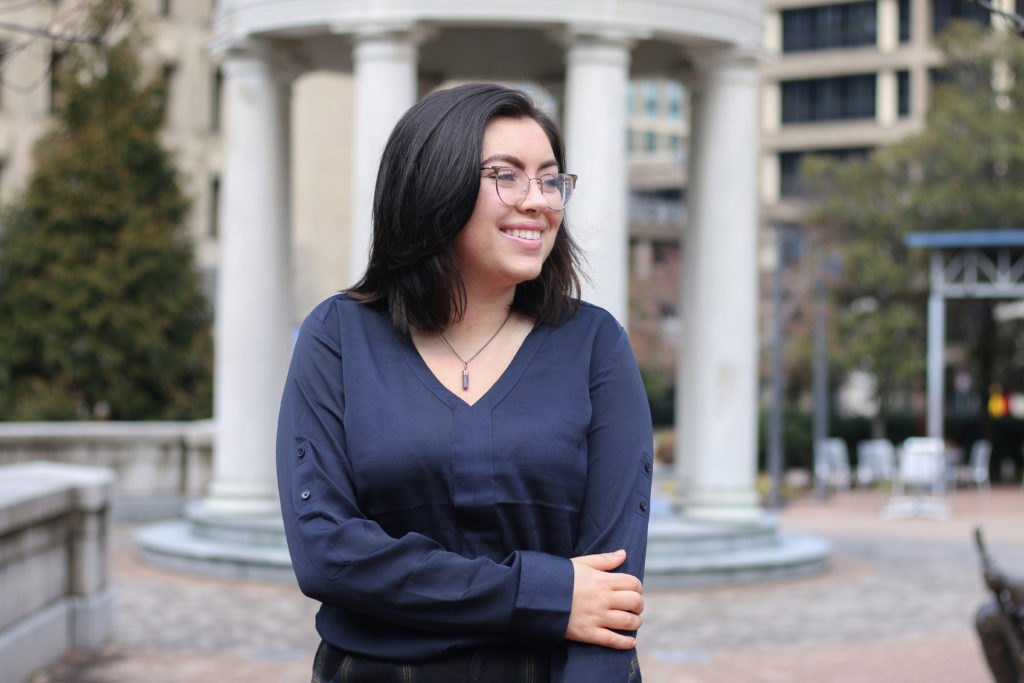A student-run initiative that restocks campus bathrooms with sanitary products is adding two buildings to its rounds, increasing the total number of serviced locations to seven.
The People for Periods project, a student-run effort to provide free access to menstrual products in bathrooms across campus like the Elliott School of International Affairs and District House, will now stock bathrooms in Duques Hall and Eckles Library. The program’s leaders said they decided to expand to the two buildings based on student feedback.
Student Association Executive Vice President Amy Martin said she relaunched the program last year after most of the original students involved graduated or left to study abroad. Martin said she splits responsibilities with volunteer coordinator McKenzie Swain as co-chairs of the project – Swain oversees volunteer coordination efforts, and Martin secures funding through the SA.
Martin said she met with officials in the Division of Operations for approval on installing shelves in Duques and Eckles bathrooms. She said she wants the program to be University-led in the future – an idea that was also floated when the program expanded last year.
“The point of this is to give access to all to make sure that everyone is healthy and is being provided the products they need to stay healthy,” Martin said.
Martin said student leaders have previously focused on increasing stocking frequency, volunteer recruitment and the number of bathroom locations but are now pushing for administrators to take responsibility of People for Periods starting next semester.
Martin said one of her main concerns before turning over the project to administrators is continuing equitable access to menstrual products, especially because officials at other universities often only stock women’s restrooms with sanitary products. Student leaders at People for Periods currently stock products in men’s, women’s and gender-neutral bathrooms, she said.
“The minute you start putting conditionals on it, and you say, ‘Well, but not in the men’s bathroom, well, but not in the gender-neutral bathroom, well, but not in this building’ – that’s the second it stops being actually equitable,” Martin said.
Mckenzie Swain, a senior and People for Periods co-chair, said a student who works at Eckles Library asked student organizers to consider the Mount Vernon Campus facility as a restocking location because several students asked student staff if any free sanitary products were available.
“Once we had actual demand, we decided that that was something that needed to happen,” Swain said.
People for Periods student volunteers stock products weekly in the B1 level of District House, the Elliott School of International Affairs, Gelman Library and the Milken Institute School of Public Health, the project’s Facebook page states. Students added Ames Hall to the restocking schedule last December.
Swain said about 10 to 12 of the program’s 40 volunteers restock buildings each week, but the student-led initiative does not have the capacity to stock every bathroom on campus. She said she would like to see the University take over the program in the future and provide menstrual products to all students on campus.
“I would definitely love to see with our volume still intact the University take it over because it is a lot ofwork to restock after every single week, and it’d be nice to see the project institutionalize and so that we can ensure that the resources are for all students in the future,” Swain said.
University spokesperson Crystal Nosal said People for Periods members began working with the facilities’ planning, construction and management departments in 2017, and officials have continued to collaborate with the group as its initiative grows. She said officials currently partner with student organizers to increase staff awareness of the initiative and address operational concerns.
“The University looks forward to continuing its work with the student leaders organizing this initiative,” Nosal said in an email.
Samantha Trentham, a senior studying political science, restocks buildings with sanitary supplies for People for Periods. Trentham said expanding the effort will further relieve students’ “unnecessary stress” about being able to afford or access menstrual products.
“I mean, it can be emotionally difficult for people, physically difficult and financially difficult as well,” Trentham said. “I mean, menstrual products are something everyone should have access to.”





